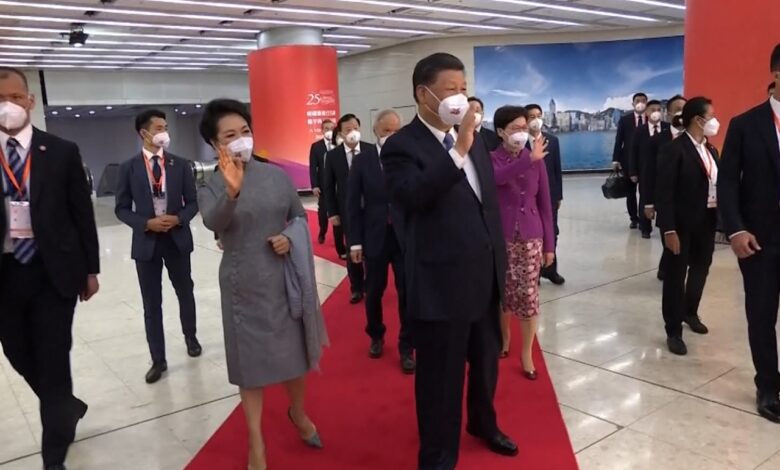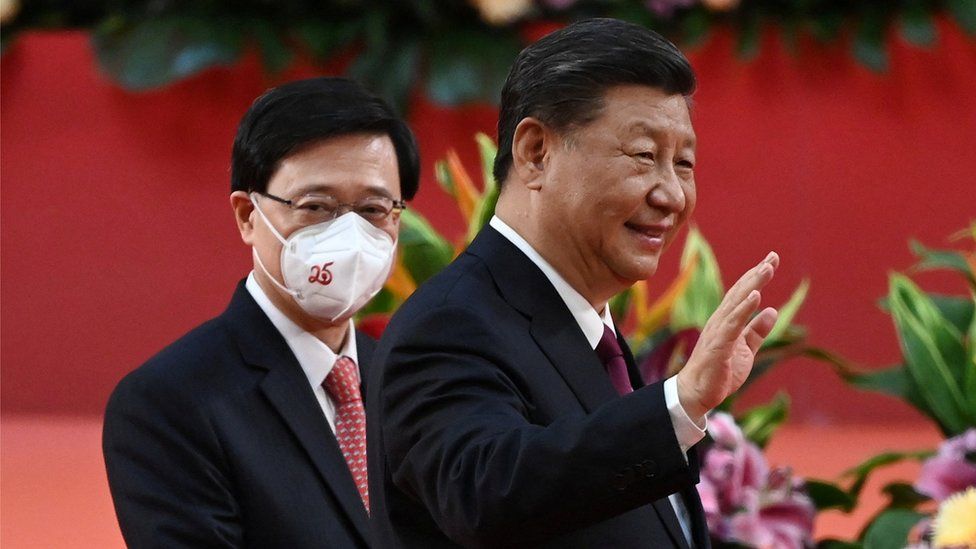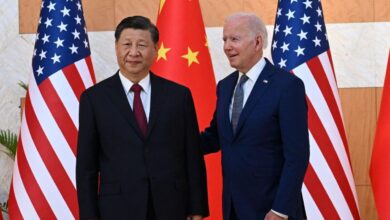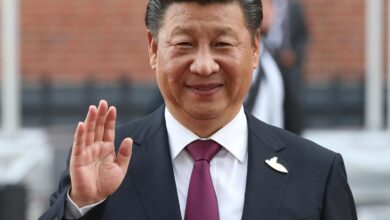
Can Xi Jinping Take Hong Kong to Prosperity?
Can Xi Jinping take Hong Kong from stability to prosperity? That’s the million-dollar question, and one that’s been swirling around global headlines for years. Hong Kong’s unique position – a vibrant, capitalist hub nestled within the authoritarian framework of China – makes its future a fascinating case study in economic and political interplay. This post delves into the complex factors shaping Hong Kong’s trajectory, examining Xi Jinping’s policies, the city’s economic health, and the ever-present undercurrent of social and political tensions.
We’ll unpack the opportunities and challenges that lie ahead, considering everything from infrastructure investment to Hong Kong’s role in the Greater Bay Area initiative.
We’ll explore the successes and shortcomings of past strategies, examining the economic indicators of the last decade and weighing the potential benefits and drawbacks of Xi’s current approach. It’s a multifaceted puzzle, and there are no easy answers, but by examining the evidence, we can attempt to form a clearer picture of Hong Kong’s potential future under Xi’s leadership.
Hong Kong’s Current Economic Situation

Hong Kong’s economy, once a paragon of Asian dynamism, is navigating a complex landscape. While it retains significant strengths, recent political events and global economic headwinds have presented considerable challenges, impacting its trajectory and competitiveness within the broader Asian financial landscape. Understanding its current state requires analyzing both its enduring advantages and its emerging vulnerabilities.
Hong Kong’s Economic Strengths and Weaknesses
Hong Kong boasts a robust and diversified economy, underpinned by its strategic geographical location, highly developed infrastructure, and a skilled workforce. Its status as a global financial center, with a well-established legal framework and efficient regulatory system, continues to attract significant foreign investment. The city’s thriving port and its role as a key player in international trade remain crucial economic pillars.
However, Hong Kong faces limitations. A high cost of living, particularly housing, significantly impacts its competitiveness and affordability for both residents and businesses. Furthermore, its relatively small domestic market restricts growth potential compared to larger Asian economies. The city’s over-reliance on certain sectors, such as finance and real estate, also exposes it to vulnerability during economic downturns.
A shrinking workforce and an aging population pose further challenges to long-term sustainable growth.
Impact of Recent Political Events on the Hong Kong Economy
The 2019 anti-government protests and the subsequent implementation of the National Security Law had a profound and multifaceted impact on Hong Kong’s economy. The unrest disrupted businesses, deterred tourism, and damaged investor confidence. The National Security Law, while aiming to restore stability, also raised concerns among international businesses about freedom of speech and the rule of law, leading to some capital flight and a dampening of foreign investment.
These events exacerbated pre-existing challenges and contributed to a period of economic slowdown. The strict Covid-19 restrictions, while aimed at public health, further hampered economic activity by disrupting supply chains and impacting the tourism sector. The resulting economic contraction was significant, highlighting the vulnerability of Hong Kong’s economy to political instability and external shocks.
Comparative Analysis of Hong Kong’s Economic Performance Against Other Major Asian Financial Hubs
Compared to other major Asian financial hubs like Singapore, Shanghai, and Tokyo, Hong Kong’s recent economic performance has been relatively weaker. While Singapore has demonstrated resilience and diversification, Shanghai’s large domestic market and government support have fueled significant growth. Tokyo, despite facing its own challenges, benefits from a larger and more diversified economy. Hong Kong’s relatively smaller size and its recent political and social challenges have hindered its ability to compete as effectively as these other centers.
However, Hong Kong still retains its strengths in certain niche financial sectors and maintains a strong position in international trade and logistics. The ongoing competition amongst these hubs remains intense, requiring Hong Kong to adapt and innovate to maintain its competitiveness.
Key Economic Indicators for Hong Kong (2013-2022)
| Year | GDP Growth (%) | Unemployment Rate (%) | Inflation Rate (%) |
|---|---|---|---|
| 2013 | 3.0 | 3.3 | 3.2 |
| 2014 | 2.3 | 3.2 | 2.9 |
| 2015 | 2.4 | 3.4 | 1.7 |
| 2016 | 1.9 | 3.3 | 1.0 |
| 2017 | 3.8 | 2.8 | 1.8 |
| 2018 | 3.0 | 2.8 | 2.0 |
| 2019 | 1.2 | 3.0 | 2.2 |
| 2020 | -6.1 | 6.6 | -0.6 |
| 2021 | 6.4 | 5.0 | 1.2 |
| 2022 | -3.5 | 3.7 | 1.8 |
Xi Jinping’s Policies and Their Impact on Hong Kong
Xi Jinping’s approach to Hong Kong represents a significant shift from the previous “one country, two systems” framework. While maintaining the principle of autonomy, his administration has prioritized national security and closer integration with mainland China, resulting in sweeping policy changes impacting Hong Kong’s economy and society. These policies, while aiming for long-term prosperity, have sparked considerable debate regarding their effectiveness and impact on Hong Kong’s unique identity.Xi Jinping’s stated goals for Hong Kong’s development center on maintaining national security, fostering economic integration with the mainland, and ensuring Hong Kong’s long-term stability and prosperity within the framework of “one country, two systems.” This involves strengthening the rule of law, promoting economic cooperation, and addressing perceived threats to national security.
The implementation of these goals, however, has been met with varying degrees of success and considerable controversy.
Specific Policies Implemented by the Chinese Government
The Chinese government has implemented a series of policies impacting Hong Kong, notably the National Security Law (NSL) enacted in 2020. This law criminalizes acts of secession, subversion, terrorism, and collusion with foreign forces, significantly altering Hong Kong’s political landscape and legal framework. Other policies include increased economic integration initiatives, such as the Greater Bay Area (GBA) plan, aiming to create a regional economic powerhouse integrating Hong Kong, Macau, and nine Guangdong cities.
Furthermore, there has been a noticeable increase in the influence of mainland Chinese institutions and businesses in Hong Kong’s economy.
Potential Benefits and Drawbacks of Xi Jinping’s Policies
The GBA initiative, for instance, holds the potential to unlock significant economic opportunities for Hong Kong, providing access to a vast market and fostering technological innovation. Increased economic integration with the mainland could also lead to enhanced infrastructure development and improved cross-border trade. However, concerns remain regarding the potential erosion of Hong Kong’s autonomy and its unique economic and legal systems.
The NSL, while aimed at maintaining stability, has raised concerns about freedom of speech and assembly, impacting Hong Kong’s international reputation and potentially deterring foreign investment. The influx of mainland capital and businesses, while potentially boosting economic growth, could also lead to increased competition and displacement of local businesses.
Comparison with Previous Approaches to Hong Kong Governance, Can xi jinping take hong kong from stability to prosperity
Prior to Xi Jinping’s administration, Hong Kong enjoyed a higher degree of autonomy under the “one country, two systems” principle. The previous approach emphasized a more hands-off approach from Beijing, allowing Hong Kong to maintain its own legal system, political institutions, and economic policies. While challenges existed, such as the widening wealth gap and political divisions, the level of autonomy was significantly greater than under the current administration.
The current approach prioritizes national security and integration with the mainland, leading to a marked shift in the balance of power and a more assertive role for the central government in Hong Kong’s affairs. This represents a fundamental departure from the previous, more laissez-faire approach.
Xi Jinping’s vision for Hong Kong’s future is ambitious, aiming for a shift from stability to genuine prosperity. However, achieving this requires navigating complex political and economic realities, a task as challenging as untangling the web of controversies surrounding powerful figures, like the revelations detailed in comeys violations read doj watchdogs list of all the times ex fbi boss broke the rules.
Ultimately, Hong Kong’s path depends on a delicate balance of power and trust, factors that are equally crucial in any successful leadership endeavor.
Social and Political Stability in Hong Kong
Hong Kong’s social and political landscape remains complex and dynamic, a legacy of its unique history and its evolving relationship with mainland China. While the city boasts a high standard of living and robust infrastructure, underlying tensions continue to shape its stability and future trajectory. The balance between maintaining a degree of autonomy and integrating more fully with China’s political and economic systems is a constant source of debate and friction.The current level of social and political stability is arguably fragile.
Can Xi Jinping truly steer Hong Kong towards lasting prosperity? It’s a complex question, hinging on maintaining stability. The recent news about California’s approach to law enforcement, as highlighted in this article, james breslo california sides with criminals over law order and police again , makes me wonder if a strong, perhaps even authoritarian, hand is sometimes necessary to establish a stable foundation for economic growth.
Ultimately, Hong Kong’s future depends on a delicate balance between freedom and order.
While large-scale protests like those seen in 2019 have subsided, a sense of underlying unease persists. This is fueled by concerns over eroding freedoms, the increasing influence of mainland China, and a perceived lack of political representation for a significant portion of the population. The implementation of the National Security Law in 2020 further tightened controls on dissent, leading to arrests and the silencing of critical voices.
Factors Affecting Social and Political Stability
Several factors contribute to, or detract from, Hong Kong’s stability. The implementation of the National Security Law is a primary concern for many, as it restricts freedoms of speech, assembly, and the press. This has created a climate of self-censorship and fear, impacting civil society organizations and independent media outlets. Conversely, the government points to a decrease in violent protests and a return to a sense of order as evidence of improved stability.
Economic anxieties, particularly among younger generations facing a challenging housing market and limited career opportunities, also fuel social unrest. Conversely, Hong Kong’s economic success and strong rule of law continue to attract foreign investment and talent. The tension between these opposing forces defines the current reality.
Public Opinion and Dissent
Public opinion in Hong Kong is highly polarized. While a segment of the population supports closer integration with mainland China and believes the National Security Law has restored order, another significant portion remains deeply concerned about the erosion of freedoms and the lack of genuine political participation. Dissent, while suppressed, continues to manifest in subtle forms, such as online activism and artistic expression.
The government’s response to dissent ranges from legal action to attempts at co-option and engagement, but a lack of open dialogue and genuine political reform continues to fuel resentment. The lack of a meaningful platform for dissent creates a simmering discontent that could easily reignite under the right circumstances.
A Potential Future Scenario: Increased Integration and Economic Diversification
One potential future scenario involves an increasing degree of integration with mainland China, accompanied by efforts to diversify Hong Kong’s economy beyond its traditional reliance on finance and real estate. This could lead to increased economic opportunities but also a further erosion of autonomy and a potential backlash from those who value Hong Kong’s unique identity. Such a scenario could see a continued crackdown on dissent, coupled with government initiatives to promote patriotism and national identity.
Economically, this could result in greater integration with the Greater Bay Area initiative, potentially leading to increased economic activity but also increased competition and a potential shift in economic power dynamics. However, a failure to address underlying social and political grievances could lead to prolonged instability and hinder long-term economic growth. The success of this scenario hinges on the government’s ability to balance economic development with the preservation of Hong Kong’s unique character and the needs of its diverse population.
A similar path was taken by Macau, which successfully integrated with mainland China while maintaining its own unique character, but it is important to note the significant differences in historical context and political systems between the two territories.
Xi Jinping’s vision for Hong Kong’s prosperity faces a complex global landscape. A key challenge lies in navigating the economic fallout from issues like the global steel market downturn, significantly impacted by, as this article details, chinese overcapacity is crushing the global steel industry. This instability, in turn, can affect Hong Kong’s economic stability and ultimately, Xi’s goals for its future.
Infrastructure Development and Investment
Hong Kong’s economic success is intrinsically linked to its robust infrastructure. Continuous investment and development in this area are crucial for maintaining its competitiveness as a global financial hub and ensuring future prosperity. This section examines recent infrastructure projects, foreign direct investment trends, potential future initiatives, and the overall impact on Hong Kong’s economic standing.
Recent Infrastructure Projects and Their Impact
Several significant infrastructure projects have been completed or are underway in Hong Kong, significantly impacting its connectivity and efficiency. The Hong Kong-Zhuhai-Macau Bridge, for instance, drastically reduced travel time between these three major economic hubs, facilitating greater trade and tourism. This mega-project exemplifies the government’s commitment to regional integration and economic diversification. Similarly, the expansion of the Hong Kong International Airport has increased its capacity, enabling it to handle a larger volume of passengers and cargo, boosting Hong Kong’s role as a crucial transportation node in Asia.
These projects, while demanding significant investment, have generated considerable economic activity, created jobs, and enhanced Hong Kong’s international connectivity.
Foreign Direct Investment in Hong Kong
Foreign direct investment (FDI) in Hong Kong has remained relatively stable in recent years, despite global economic uncertainties. While precise figures fluctuate annually depending on various global factors, Hong Kong consistently attracts substantial FDI due to its strategic location, free market economy, rule of law, and well-developed infrastructure. Much of this investment flows into the financial services sector, but significant portions also target technology, logistics, and other key industries.
The continued influx of FDI underscores investor confidence in Hong Kong’s long-term economic prospects, further supporting infrastructure development. Data from the Hong Kong Monetary Authority and Invest Hong Kong provide detailed annual reports on FDI flows and their sectoral distribution.
Potential Future Infrastructure Projects
Looking ahead, several potential infrastructure projects could significantly enhance Hong Kong’s economic competitiveness. One key area is the development of advanced transportation systems, including further expansion of the MTR subway network and exploration of high-speed rail connections to other parts of mainland China. Investing in smart city technologies, such as improved data management and digital infrastructure, would also boost efficiency and attract innovative businesses.
Furthermore, enhancing port facilities and developing logistics hubs could strengthen Hong Kong’s position as a regional trade and distribution center. These investments require careful planning and consideration of environmental and social impacts, but their potential returns in terms of economic growth and enhanced competitiveness are substantial. Similar projects in Singapore and other leading Asian cities serve as successful case studies.
Enhanced Infrastructure and Competitiveness
Improved infrastructure directly enhances Hong Kong’s competitiveness on several fronts. Efficient transportation networks reduce logistics costs, making Hong Kong a more attractive location for businesses. A robust digital infrastructure supports innovation and the growth of the technology sector. Modern port facilities ensure the smooth flow of goods, enhancing Hong Kong’s role in global trade. These improvements attract foreign investment, create jobs, and contribute to a higher standard of living for residents.
By strategically investing in its infrastructure, Hong Kong can maintain its edge as a leading global city and continue to thrive in a dynamic and competitive world. The example of Shenzhen’s rapid development, driven partly by significant infrastructure investment, highlights the transformative potential of such projects.
Hong Kong’s Role in the Greater Bay Area: Can Xi Jinping Take Hong Kong From Stability To Prosperity

Hong Kong’s participation in the Greater Bay Area (GBA) initiative is a pivotal aspect of its economic future, promising significant opportunities but also presenting considerable challenges. The GBA, encompassing Hong Kong, Macau, and nine cities in Guangdong province, aims to create a world-class economic powerhouse, leveraging the unique strengths of each participating region. Hong Kong’s role is far from passive; it’s positioned to be a crucial driver of the initiative’s success.Hong Kong’s Strengths and Contributions within the GBA
Hong Kong’s Economic Strengths within the GBA
Hong Kong’s established strengths in finance, logistics, and professional services are invaluable assets to the GBA. Its highly developed financial markets, sophisticated legal system, and robust regulatory framework provide a critical foundation for attracting foreign investment and facilitating cross-border capital flows within the area. Its world-class port and efficient logistics network are vital for handling the increased trade and commerce expected from the GBA’s growth.
Furthermore, Hong Kong’s highly skilled workforce, particularly in areas like finance and law, offers expertise that can benefit the development of other GBA cities.
Challenges Faced by Hong Kong within the GBA
Despite its advantages, Hong Kong faces challenges in integrating fully into the GBA. Competition from other GBA cities, particularly Shenzhen, with its rapidly developing technological sector and lower operating costs, poses a significant hurdle. Differences in legal systems, regulatory frameworks, and business practices can create obstacles to seamless cross-border collaboration. Furthermore, concerns about the erosion of Hong Kong’s autonomy and its unique identity within the GBA remain a sensitive issue.
Opportunities Presented by GBA Integration
The GBA offers significant opportunities for Hong Kong to diversify its economy and enhance its competitiveness. Access to a vast market of over 70 million people within the GBA provides a fertile ground for Hong Kong businesses to expand their operations and tap into new growth areas. Collaboration with other GBA cities can foster innovation and technological advancements, leading to the creation of new industries and high-value jobs in Hong Kong.
Infrastructure improvements, such as enhanced transportation links, are expected to facilitate the movement of goods, people, and capital within the GBA, boosting economic activity across the region.
Visual Representation of GBA Interconnectedness
Imagine a stylized map of the Pearl River Delta region. Hong Kong is depicted as a brightly lit, highly detailed city at the eastern edge, emphasizing its sophisticated infrastructure and financial prowess. Shenzhen, with its towering skyscrapers and vibrant technological hubs, is shown as a major node directly connected to Hong Kong via multiple high-speed rail lines and bridges, visually representing the close proximity and high level of interaction.
Guangzhou, a larger, more traditionally industrial city, is presented as a key hub connected to both Hong Kong and Shenzhen, symbolizing its role as a central logistical and manufacturing point. The other GBA cities are depicted as interconnected nodes, linked to each other and to the major hubs via a network of roads, railways, and shipping routes, all converging towards Hong Kong, highlighting its central role in finance and logistics.
The map’s color scheme emphasizes the flow of goods and services, with brighter colors representing higher levels of economic activity and connectivity, creating a visual narrative of the GBA’s interconnectedness and Hong Kong’s central position within it.
Challenges to Hong Kong’s Prosperity
Hong Kong’s economic success story, while impressive, faces significant headwinds in the 21st century. Maintaining its prosperity requires addressing a complex interplay of economic, geopolitical, and demographic factors. Failure to adapt could significantly impact its future competitiveness and stability.
Geopolitical Risks and Economic Uncertainty
Hong Kong’s unique position within the global economy, straddling China and the West, makes it vulnerable to geopolitical shifts. The ongoing US-China trade tensions, for example, have created uncertainty for businesses operating in Hong Kong, impacting investment decisions and potentially hindering growth. Increased tensions in the South China Sea or other regional conflicts could further destabilize the region and negatively impact Hong Kong’s trade and tourism sectors.
The impact of sanctions imposed on certain Chinese entities could also indirectly affect Hong Kong’s financial sector and its access to international capital markets. This necessitates diversification of trade partners and a proactive approach to risk management.
Demographic Shifts and Labor Shortages
Hong Kong’s aging population and low birth rate present a significant challenge to its future economic growth. A shrinking workforce coupled with an increasing number of retirees puts pressure on the social security system and limits the pool of talent available for businesses. This demographic trend could lead to labor shortages across various sectors, hindering productivity and competitiveness.
Furthermore, the brain drain, where skilled professionals seek opportunities elsewhere, exacerbates this problem. Addressing this requires promoting immigration of skilled workers, incentivizing higher birth rates, and investing in automation and technological advancements to improve productivity.
High Housing Costs and Income Inequality
The persistently high cost of housing in Hong Kong remains a major concern, contributing to income inequality and social unrest. This affordability crisis affects a significant portion of the population, limiting their spending power and hindering overall economic growth. The lack of affordable housing also discourages young professionals from establishing themselves in Hong Kong, further contributing to the brain drain.
Strategies to mitigate this include increasing housing supply, implementing stricter regulations on property speculation, and exploring innovative housing solutions such as modular housing and increased density in less densely populated areas. Addressing income inequality through progressive taxation and social welfare programs is also crucial.
Strategies for Sustainable Development
Mitigating these challenges requires a multi-pronged approach focusing on economic diversification, technological innovation, and social inclusivity. Hong Kong needs to actively cultivate new industries, such as fintech and advanced technology, to reduce reliance on traditional sectors. Investing in education and skills development is crucial to equip the workforce with the skills needed for the future economy. Strengthening social safety nets and promoting social mobility can help alleviate income inequality and ensure social stability.
Finally, fostering closer collaboration with mainland China while maintaining Hong Kong’s unique identity and autonomy is essential for navigating the complexities of its geopolitical environment. A well-defined long-term strategy that integrates these elements is crucial for Hong Kong’s sustainable prosperity.
Ultimately, whether Xi Jinping can successfully steer Hong Kong towards lasting prosperity remains a question mark. The path forward is paved with both immense opportunities and significant hurdles. While economic integration within the Greater Bay Area holds promise, navigating the delicate balance between economic growth and preserving Hong Kong’s unique identity will be crucial. The success or failure of this endeavor will not only impact Hong Kong’s future but will also send ripples throughout the global economic and political landscape.
The story of Hong Kong under Xi Jinping is far from over, and its unfolding will undoubtedly be one of the most compelling narratives of the 21st century.




